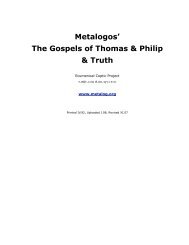Andrew Louth - Syriac Christian Church
Andrew Louth - Syriac Christian Church
Andrew Louth - Syriac Christian Church
Create successful ePaper yourself
Turn your PDF publications into a flip-book with our unique Google optimized e-Paper software.
LETTER 2:<br />
ON LOVE<br />
INTRODUCTION<br />
This letter is one of the earliest surviving works of St Maximus,<br />
written during his brief stay at the monastery of St George in Cyzicus<br />
which ended in 626 (letter 3, also to John, is in thanks for a gift to the<br />
monastery of St George). It is addressed to John the Cubicularius, a<br />
courtier in Constantinople. Like several other letters to John, it is in<br />
the second person plural, which suggests that it was written to a<br />
group (of courtiers?) in Constantinople who looked to Maximus as<br />
their spiritual father, a relationship that probably went back to<br />
Maximus’ time as a monk at Chrysopolis, just over the Bosphorus from<br />
the capital, and had maybe grown out of friendships formed when<br />
Maximus was protoasecretis in the imperial court. The letter is an<br />
encomium of love, both spendidly expressed and profound in its<br />
teaching. As Maximus’ first editor said, ‘Truly this is Maximus at his<br />
best’: vere maximum agit Maximus (PG 91:393D).<br />
It needs little introduction. But a few points might be made. First, it<br />
is archetypally Maximus in its combination of philosophical learning<br />
and quite practical, and also demanding, spiritual teaching. Maximus<br />
uses philosophical terminology to develop his understanding of love,<br />
most strikingly, perhaps, in the very abstract definition of love he<br />
provides (401D). But his teaching is quite practical: however splendid<br />
a concept love is, its touchstone is care for one’s neighbour (401D).<br />
Second, Maximus’ teaching here is, compared with his later teaching,<br />
incautiously expressed: he uses language, about there being one will<br />
between God and human beings, that he will later retract (see 396C<br />
and n. 6). Finally, nonetheless, we find here Maximus’ teaching in its<br />
characteristic breadth: at one pole is self-love, ‘the first progeny of the<br />
devil and the mother of all passions’ (397C), which cuts the human<br />
being off from God and from other human beings; at the other pole is<br />
deifying love, that breaks down all barriers, and transfigures the




